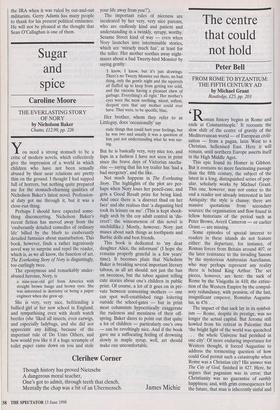Sugar and spice
Caroline Moore
THE EVERLASTING STORY OF NORY by Nicholson Baker Chatto, £12.99, pp. 226 You need a strong stomach to be a critic of modern novels, which collectively give the impression of a world in which children who have not been sexually abused by their near relations are pretty thin on the ground. I thought I had supped full of horrors, but nothing quite prepared me for the stomach-churning qualities of Nicholson Baker's latest novel. Profession- al duty got me through it, but it was a close-run thing.
Perhaps I should have expected some- thing disconcerting. Nicholson Baker's recent fiction has moved away from the `exuberantly detailed comedies of ordinary life' billed by the blurb to exuberantly detailed fantasies about masturbation. This book, however, finds a rather ingeniously novel way to surprise and repel the reader, which is, as we all know, the function of art. The Everlasting Story of Nory is disgustingly, toe-curlingly twee. The eponymous and remarkably under- abused heroine, Nory, is a nine-year-old girl from America with straight brown bangs and brown eyes. She was interested in dentistry or being a paper engineer when she grew up.
She is very, very nice, befriending a bullied girl at her new school in England, and sympathising even with death watch beetles (she 'liked all insects, even earwigs, and especially ladybugs, and she did not appreciate any killing, because of the important rule of Do Unto Others, and how would you like it if a huge scrumple of toilet paper came down on you and stole your life away from you?').
The important rules of niceness are inculcated by her very, very nice parents, who are endlessly kind and patient and understanding in a twinkly, syrupy, worthy, Sesame Street kind of way — even when Nory launches into interminable stories, which are Iniracly much fun', at least for the teller. Her mother soothes away night- saying gently: Peter Bell
`I know, I know, but it's just drawings. There's no Tweety Monster out there, no bad thing, only the gentle night and the squirrels all fluffed up to keep from getting too cold, and the racoons having a pleasant chew of garbage. Everything's all right.' Her mother's eyes were the most soothing, nicest, softest, deepest eyes that any mother could ever have. They were, to be specific, blue.
Her brother, whom they refer to as Littleguy, does 'occasionally' say
rude things that could hurt your feelings, but he was two and usually it was a question of him just not understanding what he was say- ing.
But he is basically very, very nice too, and lisps in a fashion I have not seen in print since the brave days of Victorian saccha- rine — saying that his toy trailer has 'had a bad mergency', and the like.
Not much happens in The Everlasting Story. The highlights of the plot are per- haps when Nory loses her pencil-case, and gets a Good Result prize for being kind. And once there is 'a discreet thud on her face' and she realises that 'a disgusting bird took its leisure on me'. (This is kept shock- ingly arch by the coy adult control in 'dis- creet': the winsomeness of this novel is unchildlike.) Mostly, however, Nory just muses about such things as toothpaste and Barbie dolls and best friends.
This book is dedicated to 'my dear daughter Alice, the informant' (I hope she remains properly grateful in a few years' time). It becomes plain that Nicholson Baker is breaking several important literary taboos, as all art should: not just the ban on tweeness, but the taboo against telling cute stories about one's children in public print. Of course, a lot of it goes on in pri- vate between consenting mothers — one can spot well-established rings loitering outside the school-gates — but in print most columnists hypocritically exaggerate the rudeness and messiness of their off- spring. Baker dares to point out that quite a lot of children — particularly one's own — can be revoltingly nice. And if the book gave me a suffocating feeling of drowning slowly in maple syrup, well, art should make one uncomfortable.


































































 Previous page
Previous page